Conceptual Framework in Accounting and Quality of Financial Reporting
VerifiedAdded on 2023/06/07
|15
|3073
|64
AI Summary
This proposal discusses the importance of conceptual framework in accounting and quality of financial reporting. It identifies the various aspects of the conceptual framework of accounting and the importance in the financial report preparations in the organizations.
Contribute Materials
Your contribution can guide someone’s learning journey. Share your
documents today.
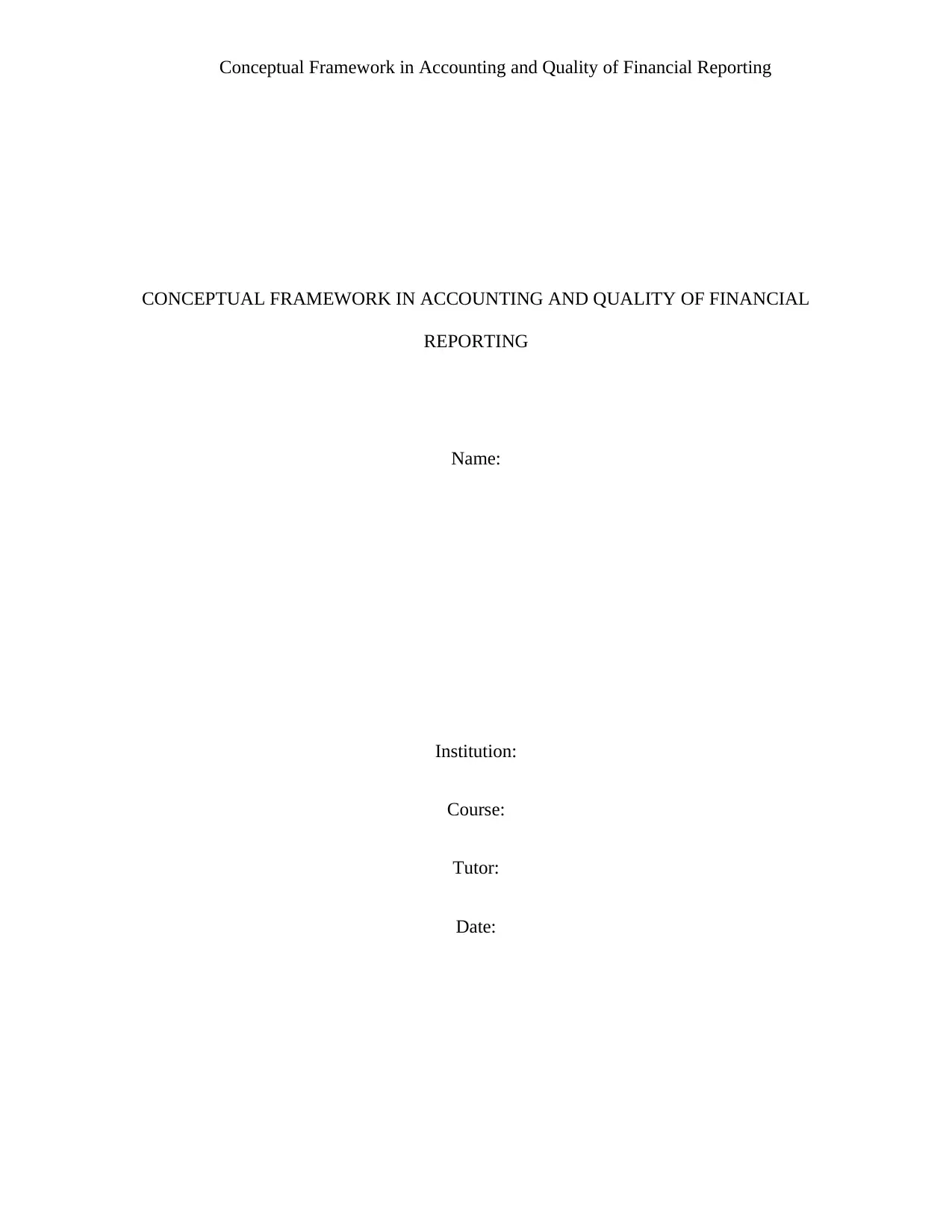
Conceptual Framework in Accounting and Quality of Financial Reporting
CONCEPTUAL FRAMEWORK IN ACCOUNTING AND QUALITY OF FINANCIAL
REPORTING
Name:
Institution:
Course:
Tutor:
Date:
CONCEPTUAL FRAMEWORK IN ACCOUNTING AND QUALITY OF FINANCIAL
REPORTING
Name:
Institution:
Course:
Tutor:
Date:
Secure Best Marks with AI Grader
Need help grading? Try our AI Grader for instant feedback on your assignments.
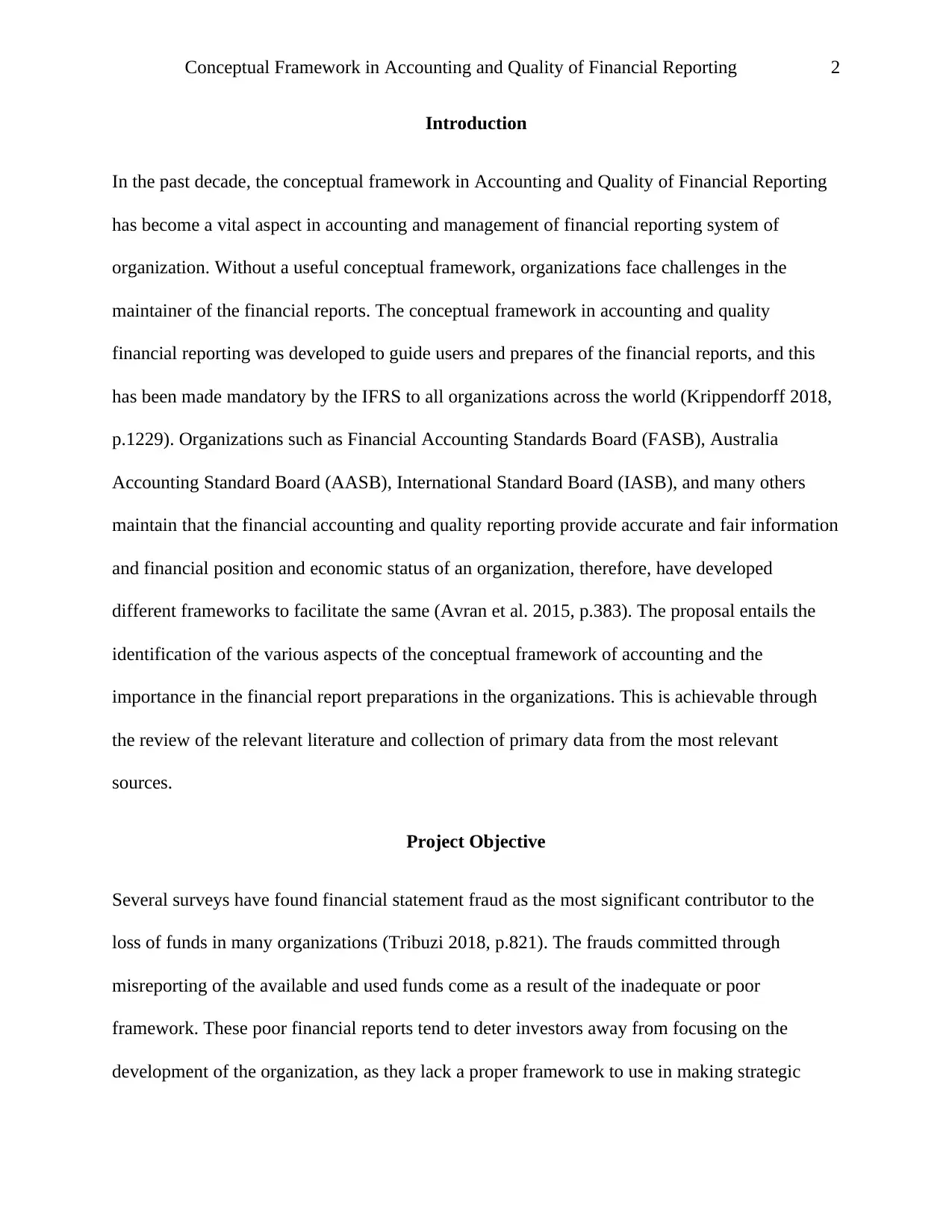
Conceptual Framework in Accounting and Quality of Financial Reporting 2
Introduction
In the past decade, the conceptual framework in Accounting and Quality of Financial Reporting
has become a vital aspect in accounting and management of financial reporting system of
organization. Without a useful conceptual framework, organizations face challenges in the
maintainer of the financial reports. The conceptual framework in accounting and quality
financial reporting was developed to guide users and prepares of the financial reports, and this
has been made mandatory by the IFRS to all organizations across the world (Krippendorff 2018,
p.1229). Organizations such as Financial Accounting Standards Board (FASB), Australia
Accounting Standard Board (AASB), International Standard Board (IASB), and many others
maintain that the financial accounting and quality reporting provide accurate and fair information
and financial position and economic status of an organization, therefore, have developed
different frameworks to facilitate the same (Avran et al. 2015, p.383). The proposal entails the
identification of the various aspects of the conceptual framework of accounting and the
importance in the financial report preparations in the organizations. This is achievable through
the review of the relevant literature and collection of primary data from the most relevant
sources.
Project Objective
Several surveys have found financial statement fraud as the most significant contributor to the
loss of funds in many organizations (Tribuzi 2018, p.821). The frauds committed through
misreporting of the available and used funds come as a result of the inadequate or poor
framework. These poor financial reports tend to deter investors away from focusing on the
development of the organization, as they lack a proper framework to use in making strategic
Introduction
In the past decade, the conceptual framework in Accounting and Quality of Financial Reporting
has become a vital aspect in accounting and management of financial reporting system of
organization. Without a useful conceptual framework, organizations face challenges in the
maintainer of the financial reports. The conceptual framework in accounting and quality
financial reporting was developed to guide users and prepares of the financial reports, and this
has been made mandatory by the IFRS to all organizations across the world (Krippendorff 2018,
p.1229). Organizations such as Financial Accounting Standards Board (FASB), Australia
Accounting Standard Board (AASB), International Standard Board (IASB), and many others
maintain that the financial accounting and quality reporting provide accurate and fair information
and financial position and economic status of an organization, therefore, have developed
different frameworks to facilitate the same (Avran et al. 2015, p.383). The proposal entails the
identification of the various aspects of the conceptual framework of accounting and the
importance in the financial report preparations in the organizations. This is achievable through
the review of the relevant literature and collection of primary data from the most relevant
sources.
Project Objective
Several surveys have found financial statement fraud as the most significant contributor to the
loss of funds in many organizations (Tribuzi 2018, p.821). The frauds committed through
misreporting of the available and used funds come as a result of the inadequate or poor
framework. These poor financial reports tend to deter investors away from focusing on the
development of the organization, as they lack a proper framework to use in making strategic
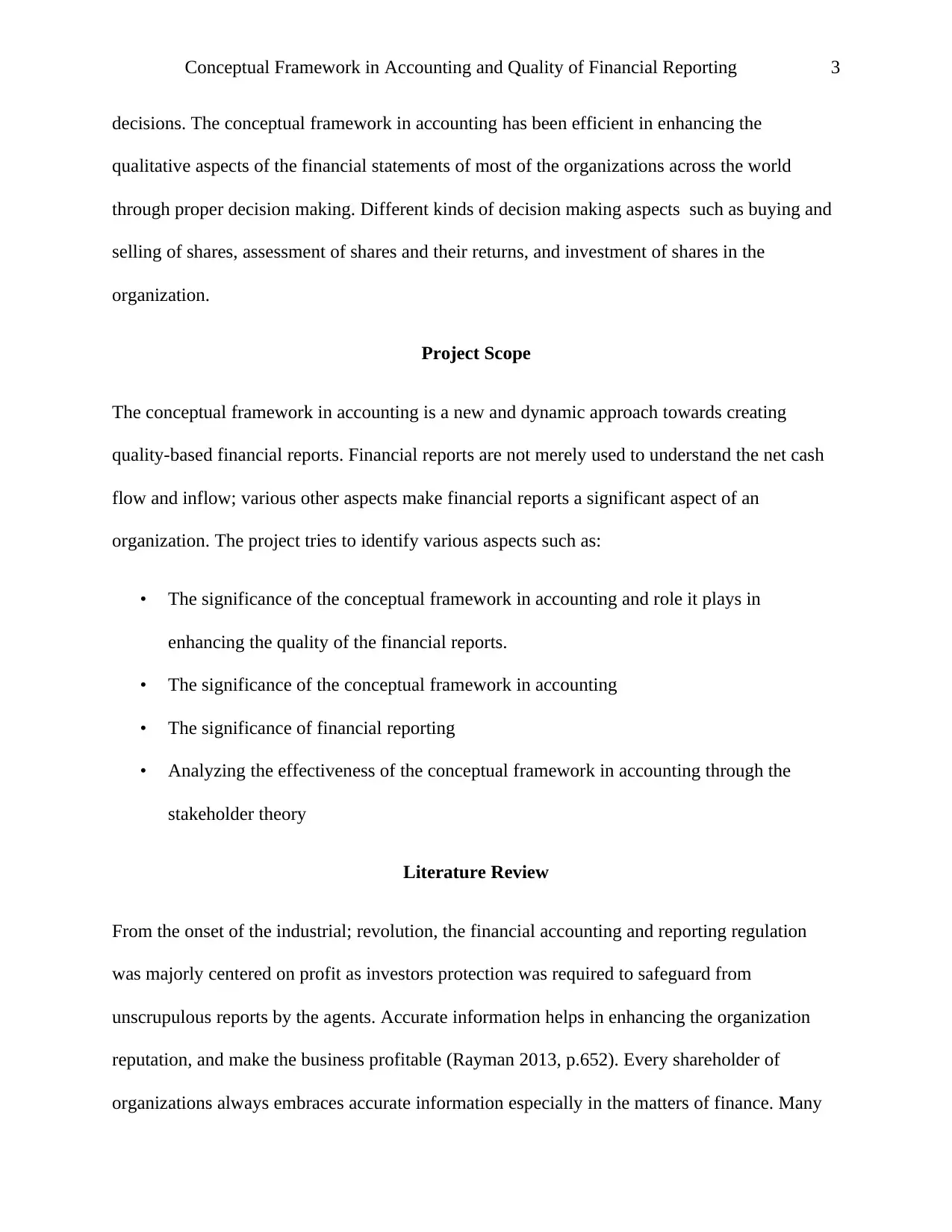
Conceptual Framework in Accounting and Quality of Financial Reporting 3
decisions. The conceptual framework in accounting has been efficient in enhancing the
qualitative aspects of the financial statements of most of the organizations across the world
through proper decision making. Different kinds of decision making aspects such as buying and
selling of shares, assessment of shares and their returns, and investment of shares in the
organization.
Project Scope
The conceptual framework in accounting is a new and dynamic approach towards creating
quality-based financial reports. Financial reports are not merely used to understand the net cash
flow and inflow; various other aspects make financial reports a significant aspect of an
organization. The project tries to identify various aspects such as:
• The significance of the conceptual framework in accounting and role it plays in
enhancing the quality of the financial reports.
• The significance of the conceptual framework in accounting
• The significance of financial reporting
• Analyzing the effectiveness of the conceptual framework in accounting through the
stakeholder theory
Literature Review
From the onset of the industrial; revolution, the financial accounting and reporting regulation
was majorly centered on profit as investors protection was required to safeguard from
unscrupulous reports by the agents. Accurate information helps in enhancing the organization
reputation, and make the business profitable (Rayman 2013, p.652). Every shareholder of
organizations always embraces accurate information especially in the matters of finance. Many
decisions. The conceptual framework in accounting has been efficient in enhancing the
qualitative aspects of the financial statements of most of the organizations across the world
through proper decision making. Different kinds of decision making aspects such as buying and
selling of shares, assessment of shares and their returns, and investment of shares in the
organization.
Project Scope
The conceptual framework in accounting is a new and dynamic approach towards creating
quality-based financial reports. Financial reports are not merely used to understand the net cash
flow and inflow; various other aspects make financial reports a significant aspect of an
organization. The project tries to identify various aspects such as:
• The significance of the conceptual framework in accounting and role it plays in
enhancing the quality of the financial reports.
• The significance of the conceptual framework in accounting
• The significance of financial reporting
• Analyzing the effectiveness of the conceptual framework in accounting through the
stakeholder theory
Literature Review
From the onset of the industrial; revolution, the financial accounting and reporting regulation
was majorly centered on profit as investors protection was required to safeguard from
unscrupulous reports by the agents. Accurate information helps in enhancing the organization
reputation, and make the business profitable (Rayman 2013, p.652). Every shareholder of
organizations always embraces accurate information especially in the matters of finance. Many
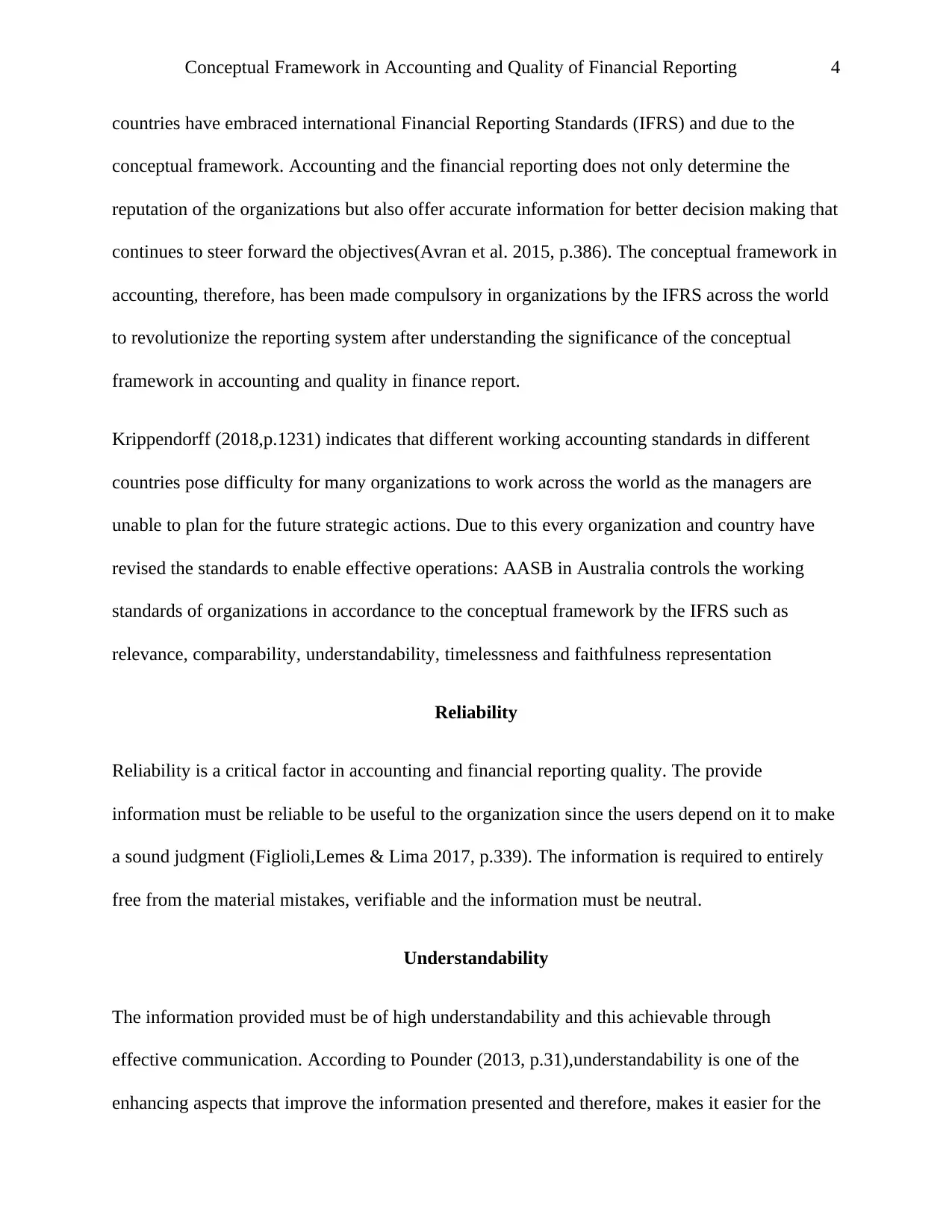
Conceptual Framework in Accounting and Quality of Financial Reporting 4
countries have embraced international Financial Reporting Standards (IFRS) and due to the
conceptual framework. Accounting and the financial reporting does not only determine the
reputation of the organizations but also offer accurate information for better decision making that
continues to steer forward the objectives(Avran et al. 2015, p.386). The conceptual framework in
accounting, therefore, has been made compulsory in organizations by the IFRS across the world
to revolutionize the reporting system after understanding the significance of the conceptual
framework in accounting and quality in finance report.
Krippendorff (2018,p.1231) indicates that different working accounting standards in different
countries pose difficulty for many organizations to work across the world as the managers are
unable to plan for the future strategic actions. Due to this every organization and country have
revised the standards to enable effective operations: AASB in Australia controls the working
standards of organizations in accordance to the conceptual framework by the IFRS such as
relevance, comparability, understandability, timelessness and faithfulness representation
Reliability
Reliability is a critical factor in accounting and financial reporting quality. The provide
information must be reliable to be useful to the organization since the users depend on it to make
a sound judgment (Figlioli,Lemes & Lima 2017, p.339). The information is required to entirely
free from the material mistakes, verifiable and the information must be neutral.
Understandability
The information provided must be of high understandability and this achievable through
effective communication. According to Pounder (2013, p.31),understandability is one of the
enhancing aspects that improve the information presented and therefore, makes it easier for the
countries have embraced international Financial Reporting Standards (IFRS) and due to the
conceptual framework. Accounting and the financial reporting does not only determine the
reputation of the organizations but also offer accurate information for better decision making that
continues to steer forward the objectives(Avran et al. 2015, p.386). The conceptual framework in
accounting, therefore, has been made compulsory in organizations by the IFRS across the world
to revolutionize the reporting system after understanding the significance of the conceptual
framework in accounting and quality in finance report.
Krippendorff (2018,p.1231) indicates that different working accounting standards in different
countries pose difficulty for many organizations to work across the world as the managers are
unable to plan for the future strategic actions. Due to this every organization and country have
revised the standards to enable effective operations: AASB in Australia controls the working
standards of organizations in accordance to the conceptual framework by the IFRS such as
relevance, comparability, understandability, timelessness and faithfulness representation
Reliability
Reliability is a critical factor in accounting and financial reporting quality. The provide
information must be reliable to be useful to the organization since the users depend on it to make
a sound judgment (Figlioli,Lemes & Lima 2017, p.339). The information is required to entirely
free from the material mistakes, verifiable and the information must be neutral.
Understandability
The information provided must be of high understandability and this achievable through
effective communication. According to Pounder (2013, p.31),understandability is one of the
enhancing aspects that improve the information presented and therefore, makes it easier for the
Secure Best Marks with AI Grader
Need help grading? Try our AI Grader for instant feedback on your assignments.
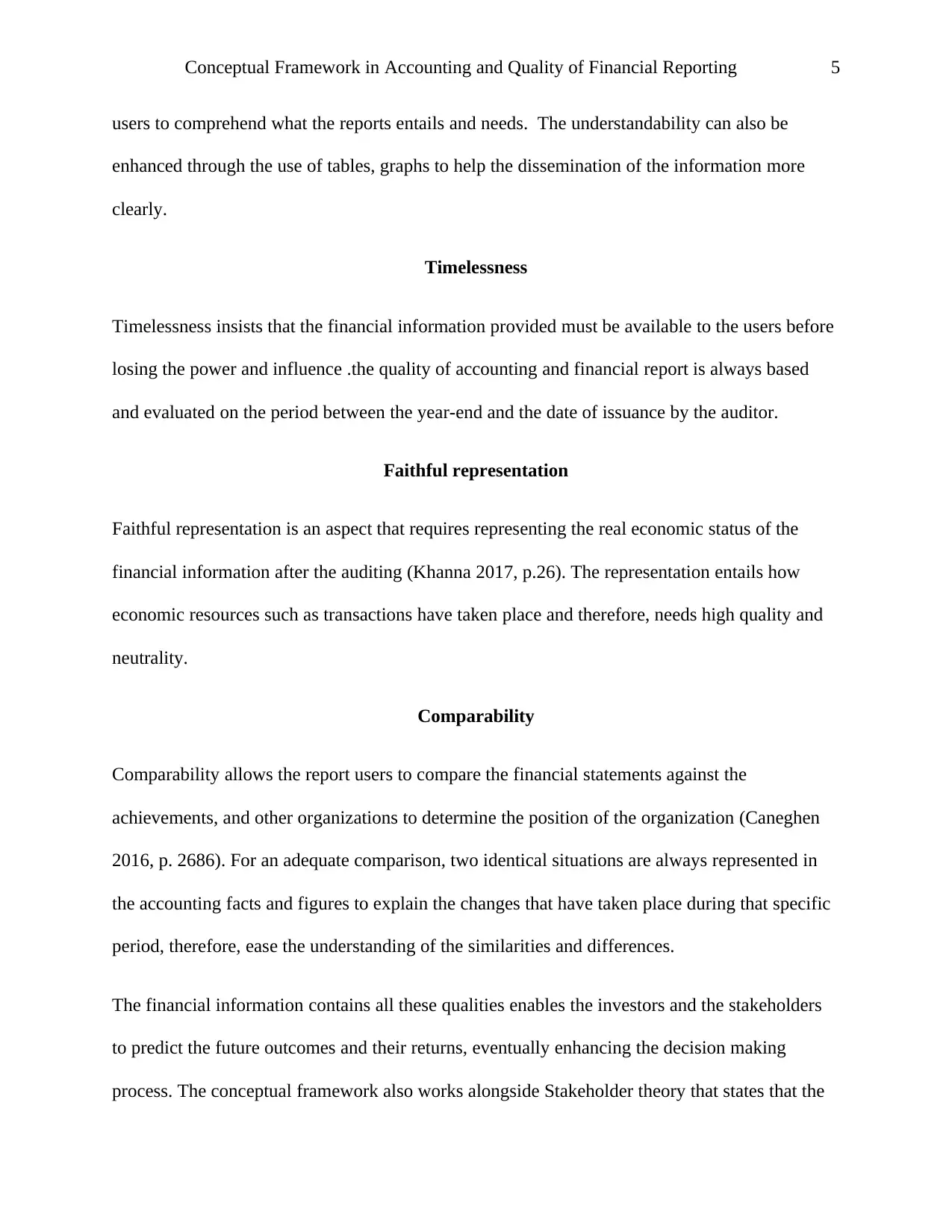
Conceptual Framework in Accounting and Quality of Financial Reporting 5
users to comprehend what the reports entails and needs. The understandability can also be
enhanced through the use of tables, graphs to help the dissemination of the information more
clearly.
Timelessness
Timelessness insists that the financial information provided must be available to the users before
losing the power and influence .the quality of accounting and financial report is always based
and evaluated on the period between the year-end and the date of issuance by the auditor.
Faithful representation
Faithful representation is an aspect that requires representing the real economic status of the
financial information after the auditing (Khanna 2017, p.26). The representation entails how
economic resources such as transactions have taken place and therefore, needs high quality and
neutrality.
Comparability
Comparability allows the report users to compare the financial statements against the
achievements, and other organizations to determine the position of the organization (Caneghen
2016, p. 2686). For an adequate comparison, two identical situations are always represented in
the accounting facts and figures to explain the changes that have taken place during that specific
period, therefore, ease the understanding of the similarities and differences.
The financial information contains all these qualities enables the investors and the stakeholders
to predict the future outcomes and their returns, eventually enhancing the decision making
process. The conceptual framework also works alongside Stakeholder theory that states that the
users to comprehend what the reports entails and needs. The understandability can also be
enhanced through the use of tables, graphs to help the dissemination of the information more
clearly.
Timelessness
Timelessness insists that the financial information provided must be available to the users before
losing the power and influence .the quality of accounting and financial report is always based
and evaluated on the period between the year-end and the date of issuance by the auditor.
Faithful representation
Faithful representation is an aspect that requires representing the real economic status of the
financial information after the auditing (Khanna 2017, p.26). The representation entails how
economic resources such as transactions have taken place and therefore, needs high quality and
neutrality.
Comparability
Comparability allows the report users to compare the financial statements against the
achievements, and other organizations to determine the position of the organization (Caneghen
2016, p. 2686). For an adequate comparison, two identical situations are always represented in
the accounting facts and figures to explain the changes that have taken place during that specific
period, therefore, ease the understanding of the similarities and differences.
The financial information contains all these qualities enables the investors and the stakeholders
to predict the future outcomes and their returns, eventually enhancing the decision making
process. The conceptual framework also works alongside Stakeholder theory that states that the
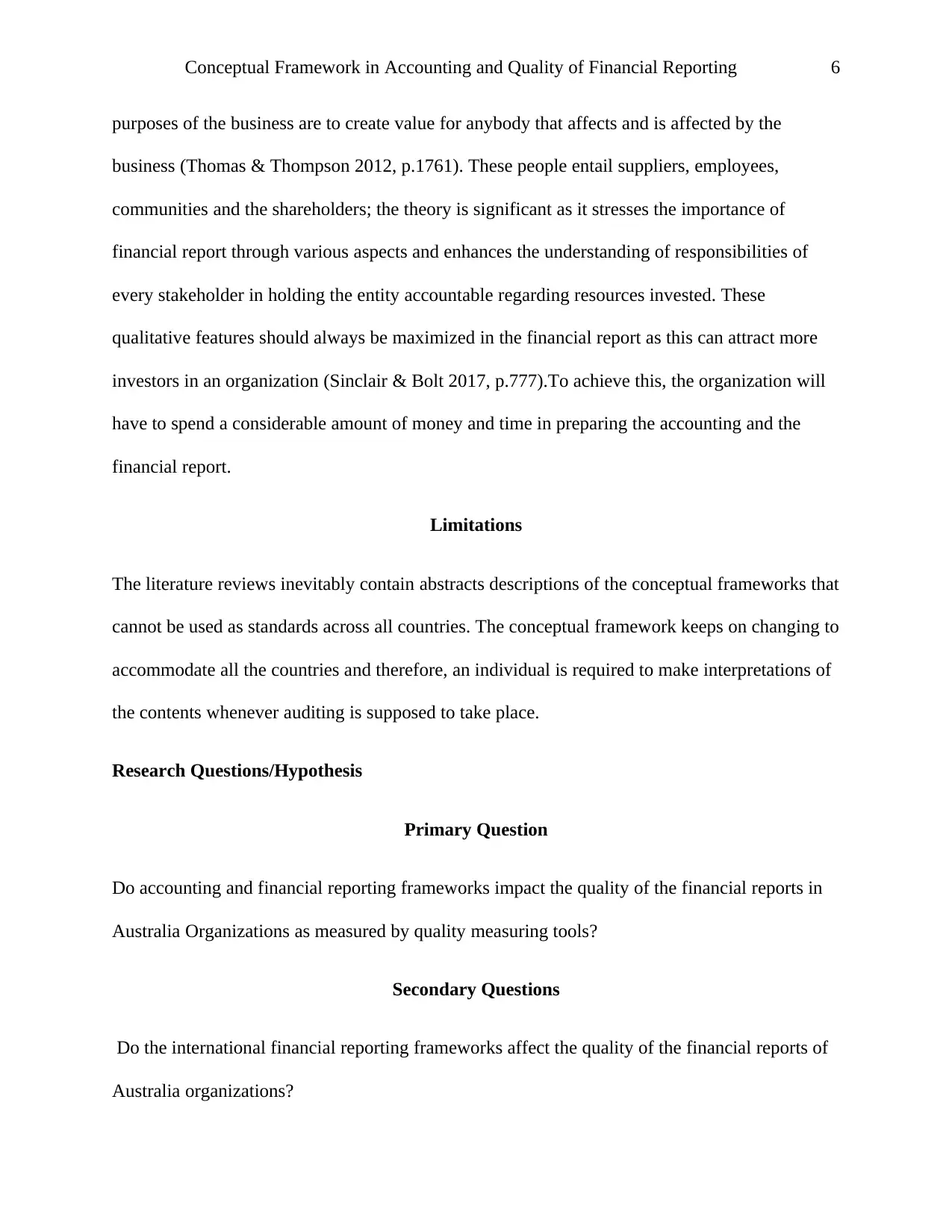
Conceptual Framework in Accounting and Quality of Financial Reporting 6
purposes of the business are to create value for anybody that affects and is affected by the
business (Thomas & Thompson 2012, p.1761). These people entail suppliers, employees,
communities and the shareholders; the theory is significant as it stresses the importance of
financial report through various aspects and enhances the understanding of responsibilities of
every stakeholder in holding the entity accountable regarding resources invested. These
qualitative features should always be maximized in the financial report as this can attract more
investors in an organization (Sinclair & Bolt 2017, p.777).To achieve this, the organization will
have to spend a considerable amount of money and time in preparing the accounting and the
financial report.
Limitations
The literature reviews inevitably contain abstracts descriptions of the conceptual frameworks that
cannot be used as standards across all countries. The conceptual framework keeps on changing to
accommodate all the countries and therefore, an individual is required to make interpretations of
the contents whenever auditing is supposed to take place.
Research Questions/Hypothesis
Primary Question
Do accounting and financial reporting frameworks impact the quality of the financial reports in
Australia Organizations as measured by quality measuring tools?
Secondary Questions
Do the international financial reporting frameworks affect the quality of the financial reports of
Australia organizations?
purposes of the business are to create value for anybody that affects and is affected by the
business (Thomas & Thompson 2012, p.1761). These people entail suppliers, employees,
communities and the shareholders; the theory is significant as it stresses the importance of
financial report through various aspects and enhances the understanding of responsibilities of
every stakeholder in holding the entity accountable regarding resources invested. These
qualitative features should always be maximized in the financial report as this can attract more
investors in an organization (Sinclair & Bolt 2017, p.777).To achieve this, the organization will
have to spend a considerable amount of money and time in preparing the accounting and the
financial report.
Limitations
The literature reviews inevitably contain abstracts descriptions of the conceptual frameworks that
cannot be used as standards across all countries. The conceptual framework keeps on changing to
accommodate all the countries and therefore, an individual is required to make interpretations of
the contents whenever auditing is supposed to take place.
Research Questions/Hypothesis
Primary Question
Do accounting and financial reporting frameworks impact the quality of the financial reports in
Australia Organizations as measured by quality measuring tools?
Secondary Questions
Do the international financial reporting frameworks affect the quality of the financial reports of
Australia organizations?
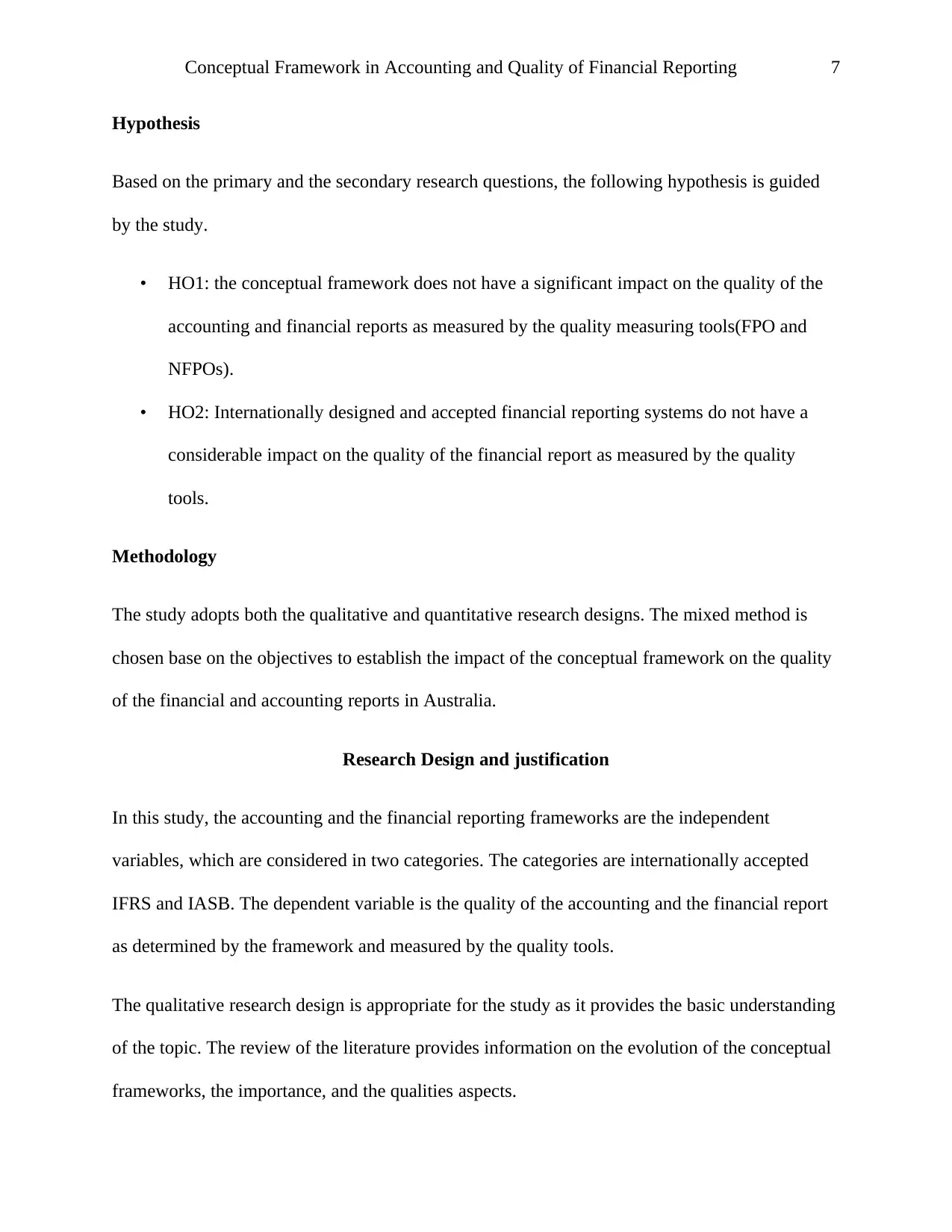
Conceptual Framework in Accounting and Quality of Financial Reporting 7
Hypothesis
Based on the primary and the secondary research questions, the following hypothesis is guided
by the study.
• HO1: the conceptual framework does not have a significant impact on the quality of the
accounting and financial reports as measured by the quality measuring tools(FPO and
NFPOs).
• HO2: Internationally designed and accepted financial reporting systems do not have a
considerable impact on the quality of the financial report as measured by the quality
tools.
Methodology
The study adopts both the qualitative and quantitative research designs. The mixed method is
chosen base on the objectives to establish the impact of the conceptual framework on the quality
of the financial and accounting reports in Australia.
Research Design and justification
In this study, the accounting and the financial reporting frameworks are the independent
variables, which are considered in two categories. The categories are internationally accepted
IFRS and IASB. The dependent variable is the quality of the accounting and the financial report
as determined by the framework and measured by the quality tools.
The qualitative research design is appropriate for the study as it provides the basic understanding
of the topic. The review of the literature provides information on the evolution of the conceptual
frameworks, the importance, and the qualities aspects.
Hypothesis
Based on the primary and the secondary research questions, the following hypothesis is guided
by the study.
• HO1: the conceptual framework does not have a significant impact on the quality of the
accounting and financial reports as measured by the quality measuring tools(FPO and
NFPOs).
• HO2: Internationally designed and accepted financial reporting systems do not have a
considerable impact on the quality of the financial report as measured by the quality
tools.
Methodology
The study adopts both the qualitative and quantitative research designs. The mixed method is
chosen base on the objectives to establish the impact of the conceptual framework on the quality
of the financial and accounting reports in Australia.
Research Design and justification
In this study, the accounting and the financial reporting frameworks are the independent
variables, which are considered in two categories. The categories are internationally accepted
IFRS and IASB. The dependent variable is the quality of the accounting and the financial report
as determined by the framework and measured by the quality tools.
The qualitative research design is appropriate for the study as it provides the basic understanding
of the topic. The review of the literature provides information on the evolution of the conceptual
frameworks, the importance, and the qualities aspects.
Paraphrase This Document
Need a fresh take? Get an instant paraphrase of this document with our AI Paraphraser
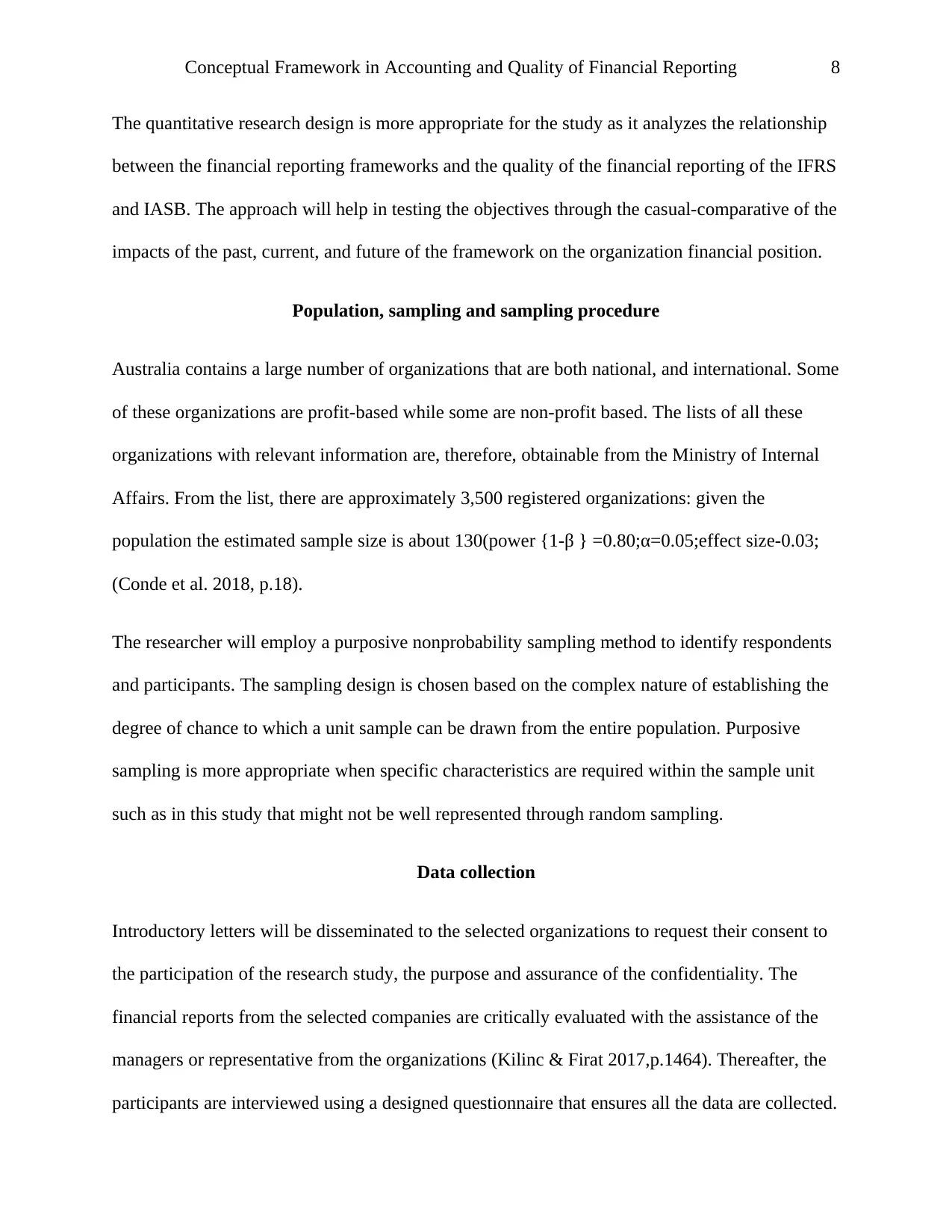
Conceptual Framework in Accounting and Quality of Financial Reporting 8
The quantitative research design is more appropriate for the study as it analyzes the relationship
between the financial reporting frameworks and the quality of the financial reporting of the IFRS
and IASB. The approach will help in testing the objectives through the casual-comparative of the
impacts of the past, current, and future of the framework on the organization financial position.
Population, sampling and sampling procedure
Australia contains a large number of organizations that are both national, and international. Some
of these organizations are profit-based while some are non-profit based. The lists of all these
organizations with relevant information are, therefore, obtainable from the Ministry of Internal
Affairs. From the list, there are approximately 3,500 registered organizations: given the
population the estimated sample size is about 130(power {1-β } =0.80;α=0.05;effect size-0.03;
(Conde et al. 2018, p.18).
The researcher will employ a purposive nonprobability sampling method to identify respondents
and participants. The sampling design is chosen based on the complex nature of establishing the
degree of chance to which a unit sample can be drawn from the entire population. Purposive
sampling is more appropriate when specific characteristics are required within the sample unit
such as in this study that might not be well represented through random sampling.
Data collection
Introductory letters will be disseminated to the selected organizations to request their consent to
the participation of the research study, the purpose and assurance of the confidentiality. The
financial reports from the selected companies are critically evaluated with the assistance of the
managers or representative from the organizations (Kilinc & Firat 2017,p.1464). Thereafter, the
participants are interviewed using a designed questionnaire that ensures all the data are collected.
The quantitative research design is more appropriate for the study as it analyzes the relationship
between the financial reporting frameworks and the quality of the financial reporting of the IFRS
and IASB. The approach will help in testing the objectives through the casual-comparative of the
impacts of the past, current, and future of the framework on the organization financial position.
Population, sampling and sampling procedure
Australia contains a large number of organizations that are both national, and international. Some
of these organizations are profit-based while some are non-profit based. The lists of all these
organizations with relevant information are, therefore, obtainable from the Ministry of Internal
Affairs. From the list, there are approximately 3,500 registered organizations: given the
population the estimated sample size is about 130(power {1-β } =0.80;α=0.05;effect size-0.03;
(Conde et al. 2018, p.18).
The researcher will employ a purposive nonprobability sampling method to identify respondents
and participants. The sampling design is chosen based on the complex nature of establishing the
degree of chance to which a unit sample can be drawn from the entire population. Purposive
sampling is more appropriate when specific characteristics are required within the sample unit
such as in this study that might not be well represented through random sampling.
Data collection
Introductory letters will be disseminated to the selected organizations to request their consent to
the participation of the research study, the purpose and assurance of the confidentiality. The
financial reports from the selected companies are critically evaluated with the assistance of the
managers or representative from the organizations (Kilinc & Firat 2017,p.1464). Thereafter, the
participants are interviewed using a designed questionnaire that ensures all the data are collected.
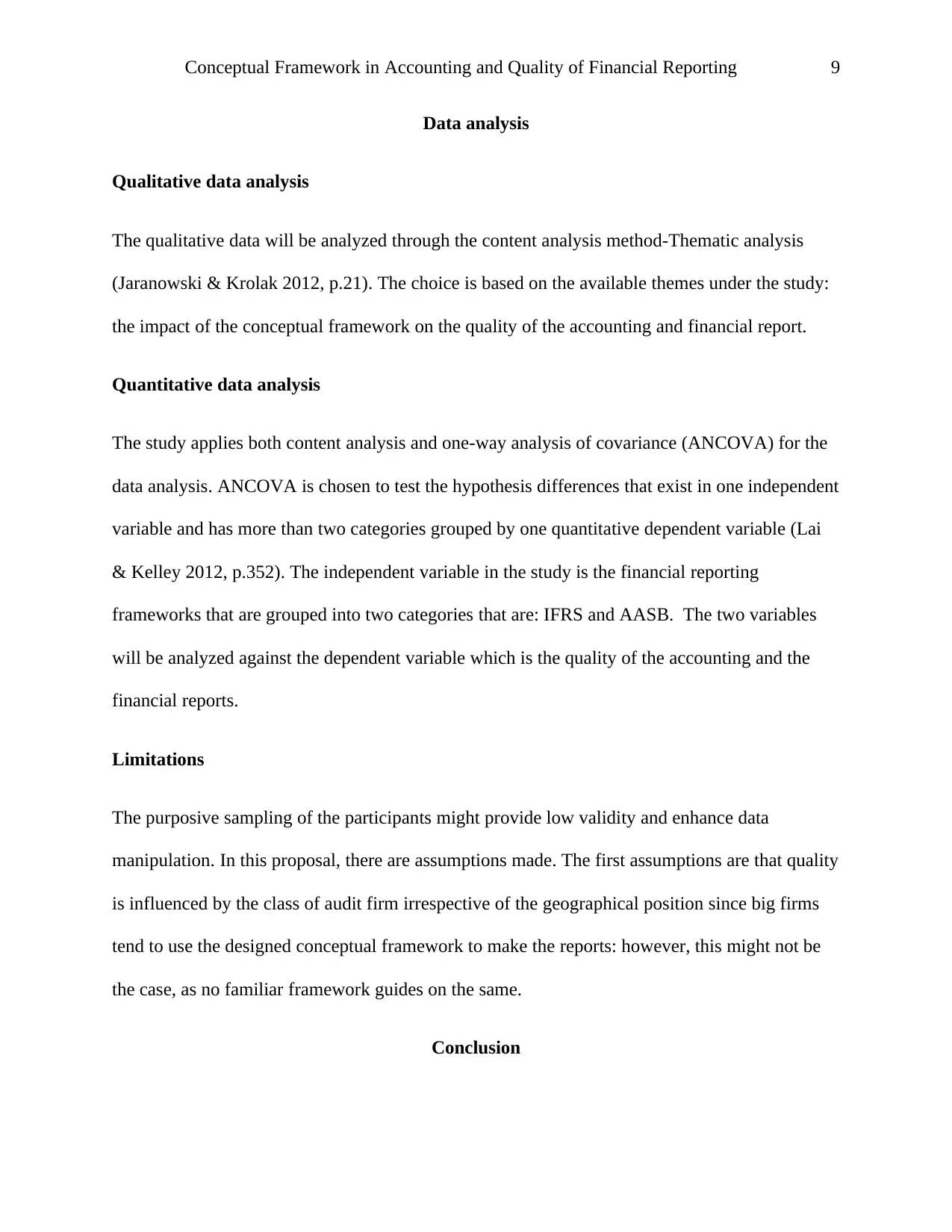
Conceptual Framework in Accounting and Quality of Financial Reporting 9
Data analysis
Qualitative data analysis
The qualitative data will be analyzed through the content analysis method-Thematic analysis
(Jaranowski & Krolak 2012, p.21). The choice is based on the available themes under the study:
the impact of the conceptual framework on the quality of the accounting and financial report.
Quantitative data analysis
The study applies both content analysis and one-way analysis of covariance (ANCOVA) for the
data analysis. ANCOVA is chosen to test the hypothesis differences that exist in one independent
variable and has more than two categories grouped by one quantitative dependent variable (Lai
& Kelley 2012, p.352). The independent variable in the study is the financial reporting
frameworks that are grouped into two categories that are: IFRS and AASB. The two variables
will be analyzed against the dependent variable which is the quality of the accounting and the
financial reports.
Limitations
The purposive sampling of the participants might provide low validity and enhance data
manipulation. In this proposal, there are assumptions made. The first assumptions are that quality
is influenced by the class of audit firm irrespective of the geographical position since big firms
tend to use the designed conceptual framework to make the reports: however, this might not be
the case, as no familiar framework guides on the same.
Conclusion
Data analysis
Qualitative data analysis
The qualitative data will be analyzed through the content analysis method-Thematic analysis
(Jaranowski & Krolak 2012, p.21). The choice is based on the available themes under the study:
the impact of the conceptual framework on the quality of the accounting and financial report.
Quantitative data analysis
The study applies both content analysis and one-way analysis of covariance (ANCOVA) for the
data analysis. ANCOVA is chosen to test the hypothesis differences that exist in one independent
variable and has more than two categories grouped by one quantitative dependent variable (Lai
& Kelley 2012, p.352). The independent variable in the study is the financial reporting
frameworks that are grouped into two categories that are: IFRS and AASB. The two variables
will be analyzed against the dependent variable which is the quality of the accounting and the
financial reports.
Limitations
The purposive sampling of the participants might provide low validity and enhance data
manipulation. In this proposal, there are assumptions made. The first assumptions are that quality
is influenced by the class of audit firm irrespective of the geographical position since big firms
tend to use the designed conceptual framework to make the reports: however, this might not be
the case, as no familiar framework guides on the same.
Conclusion
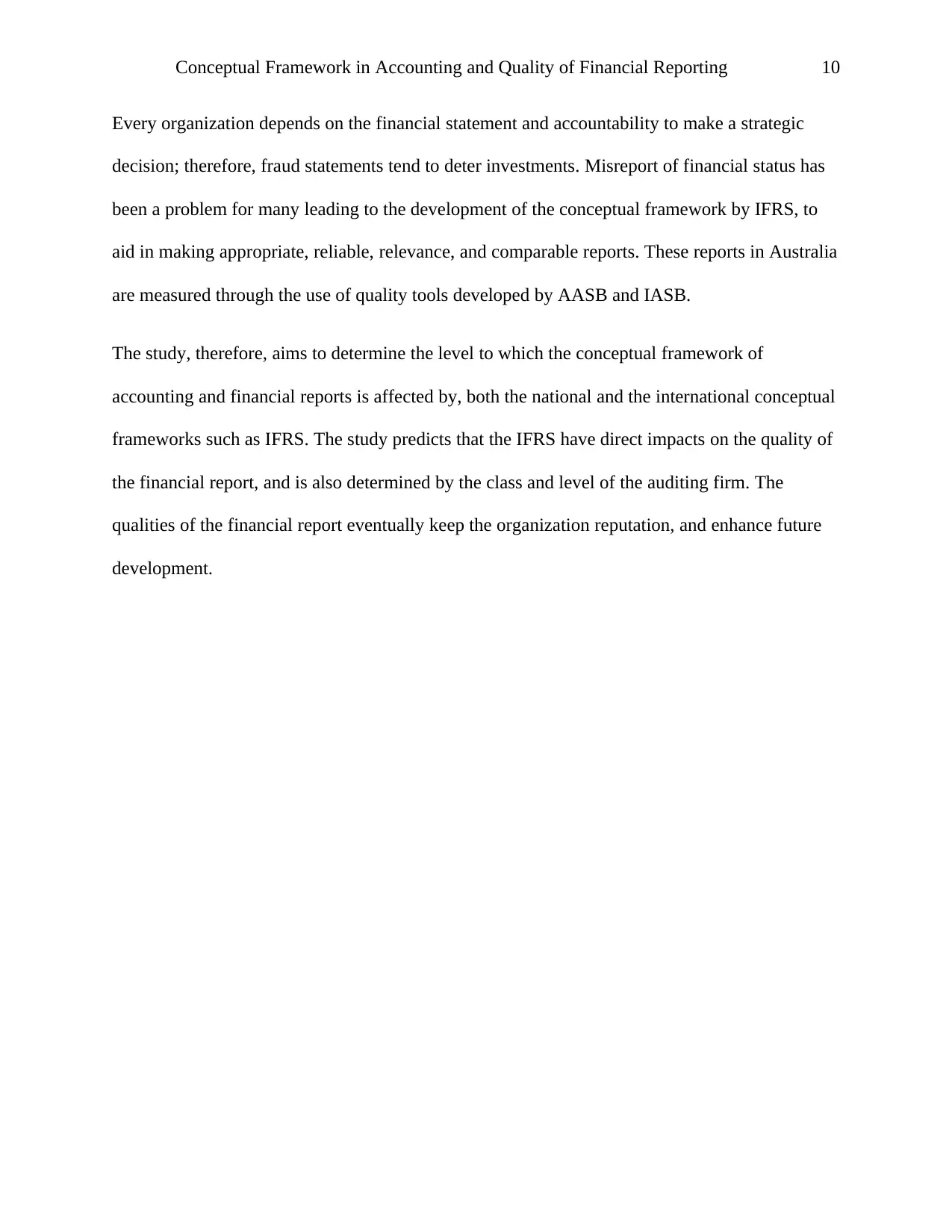
Conceptual Framework in Accounting and Quality of Financial Reporting 10
Every organization depends on the financial statement and accountability to make a strategic
decision; therefore, fraud statements tend to deter investments. Misreport of financial status has
been a problem for many leading to the development of the conceptual framework by IFRS, to
aid in making appropriate, reliable, relevance, and comparable reports. These reports in Australia
are measured through the use of quality tools developed by AASB and IASB.
The study, therefore, aims to determine the level to which the conceptual framework of
accounting and financial reports is affected by, both the national and the international conceptual
frameworks such as IFRS. The study predicts that the IFRS have direct impacts on the quality of
the financial report, and is also determined by the class and level of the auditing firm. The
qualities of the financial report eventually keep the organization reputation, and enhance future
development.
Every organization depends on the financial statement and accountability to make a strategic
decision; therefore, fraud statements tend to deter investments. Misreport of financial status has
been a problem for many leading to the development of the conceptual framework by IFRS, to
aid in making appropriate, reliable, relevance, and comparable reports. These reports in Australia
are measured through the use of quality tools developed by AASB and IASB.
The study, therefore, aims to determine the level to which the conceptual framework of
accounting and financial reports is affected by, both the national and the international conceptual
frameworks such as IFRS. The study predicts that the IFRS have direct impacts on the quality of
the financial report, and is also determined by the class and level of the auditing firm. The
qualities of the financial report eventually keep the organization reputation, and enhance future
development.
Secure Best Marks with AI Grader
Need help grading? Try our AI Grader for instant feedback on your assignments.
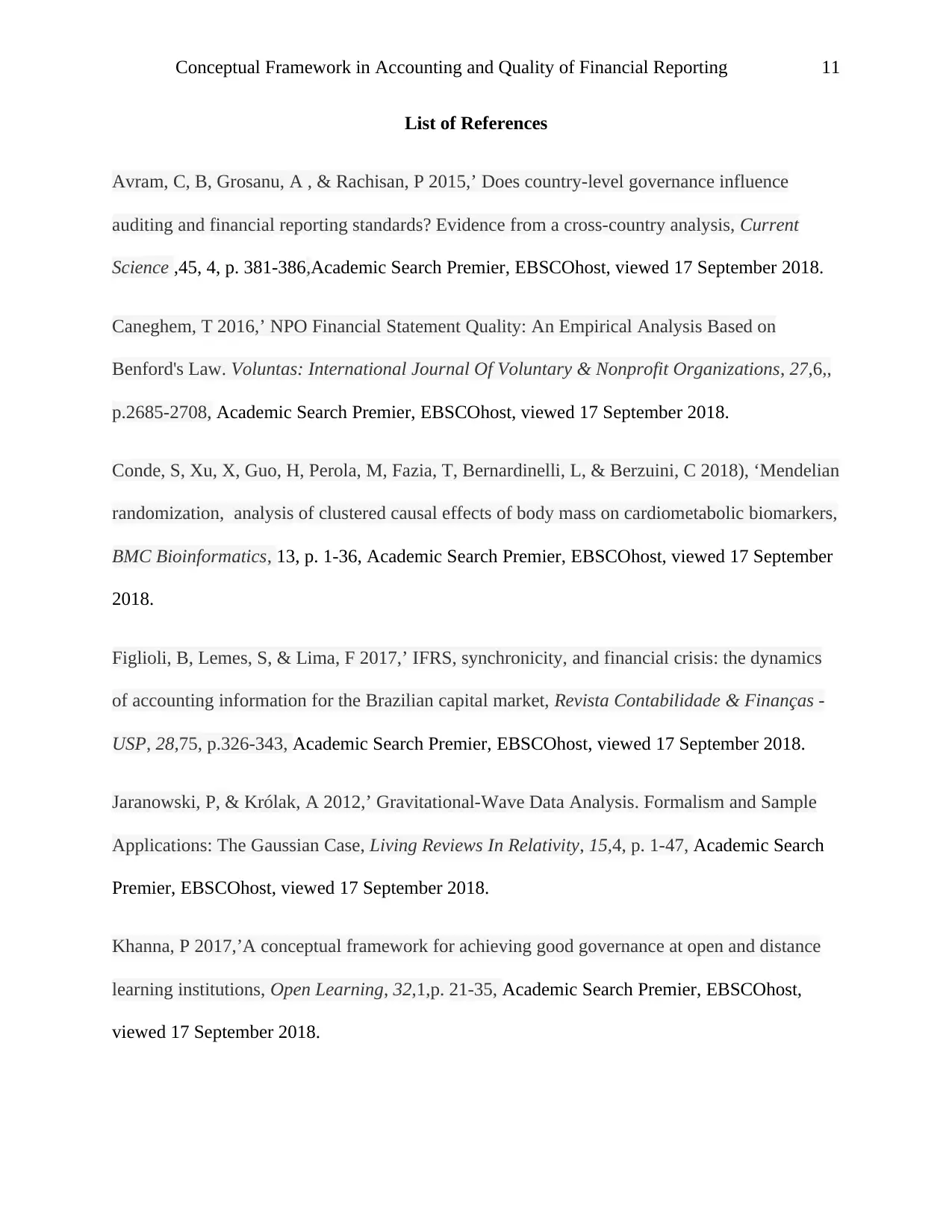
Conceptual Framework in Accounting and Quality of Financial Reporting 11
List of References
Avram, C, B, Grosanu, A , & Rachisan, P 2015,’ Does country-level governance influence
auditing and financial reporting standards? Evidence from a cross-country analysis, Current
Science ,45, 4, p. 381-386,Academic Search Premier, EBSCOhost, viewed 17 September 2018.
Caneghem, T 2016,’ NPO Financial Statement Quality: An Empirical Analysis Based on
Benford's Law. Voluntas: International Journal Of Voluntary & Nonprofit Organizations, 27,6,,
p.2685-2708, Academic Search Premier, EBSCOhost, viewed 17 September 2018.
Conde, S, Xu, X, Guo, H, Perola, M, Fazia, T, Bernardinelli, L, & Berzuini, C 2018), ‘Mendelian
randomization, analysis of clustered causal effects of body mass on cardiometabolic biomarkers,
BMC Bioinformatics, 13, p. 1-36, Academic Search Premier, EBSCOhost, viewed 17 September
2018.
Figlioli, B, Lemes, S, & Lima, F 2017,’ IFRS, synchronicity, and financial crisis: the dynamics
of accounting information for the Brazilian capital market, Revista Contabilidade & Finanças -
USP, 28,75, p.326-343, Academic Search Premier, EBSCOhost, viewed 17 September 2018.
Jaranowski, P, & Królak, A 2012,’ Gravitational-Wave Data Analysis. Formalism and Sample
Applications: The Gaussian Case, Living Reviews In Relativity, 15,4, p. 1-47, Academic Search
Premier, EBSCOhost, viewed 17 September 2018.
Khanna, P 2017,’A conceptual framework for achieving good governance at open and distance
learning institutions, Open Learning, 32,1,p. 21-35, Academic Search Premier, EBSCOhost,
viewed 17 September 2018.
List of References
Avram, C, B, Grosanu, A , & Rachisan, P 2015,’ Does country-level governance influence
auditing and financial reporting standards? Evidence from a cross-country analysis, Current
Science ,45, 4, p. 381-386,Academic Search Premier, EBSCOhost, viewed 17 September 2018.
Caneghem, T 2016,’ NPO Financial Statement Quality: An Empirical Analysis Based on
Benford's Law. Voluntas: International Journal Of Voluntary & Nonprofit Organizations, 27,6,,
p.2685-2708, Academic Search Premier, EBSCOhost, viewed 17 September 2018.
Conde, S, Xu, X, Guo, H, Perola, M, Fazia, T, Bernardinelli, L, & Berzuini, C 2018), ‘Mendelian
randomization, analysis of clustered causal effects of body mass on cardiometabolic biomarkers,
BMC Bioinformatics, 13, p. 1-36, Academic Search Premier, EBSCOhost, viewed 17 September
2018.
Figlioli, B, Lemes, S, & Lima, F 2017,’ IFRS, synchronicity, and financial crisis: the dynamics
of accounting information for the Brazilian capital market, Revista Contabilidade & Finanças -
USP, 28,75, p.326-343, Academic Search Premier, EBSCOhost, viewed 17 September 2018.
Jaranowski, P, & Królak, A 2012,’ Gravitational-Wave Data Analysis. Formalism and Sample
Applications: The Gaussian Case, Living Reviews In Relativity, 15,4, p. 1-47, Academic Search
Premier, EBSCOhost, viewed 17 September 2018.
Khanna, P 2017,’A conceptual framework for achieving good governance at open and distance
learning institutions, Open Learning, 32,1,p. 21-35, Academic Search Premier, EBSCOhost,
viewed 17 September 2018.
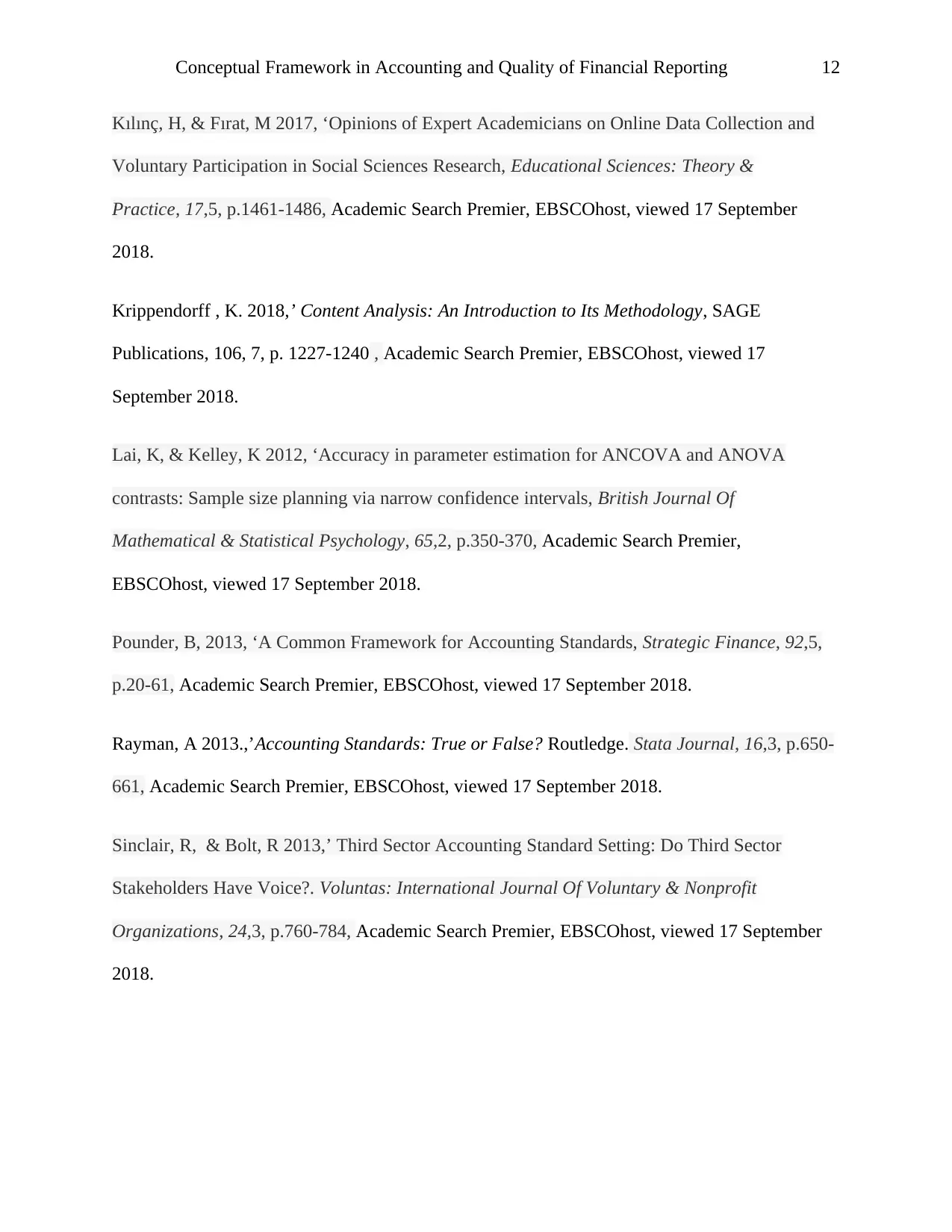
Conceptual Framework in Accounting and Quality of Financial Reporting 12
Kılınç, H, & Fırat, M 2017, ‘Opinions of Expert Academicians on Online Data Collection and
Voluntary Participation in Social Sciences Research, Educational Sciences: Theory &
Practice, 17,5, p.1461-1486, Academic Search Premier, EBSCOhost, viewed 17 September
2018.
Krippendorff , K. 2018,’ Content Analysis: An Introduction to Its Methodology, SAGE
Publications, 106, 7, p. 1227-1240 , Academic Search Premier, EBSCOhost, viewed 17
September 2018.
Lai, K, & Kelley, K 2012, ‘Accuracy in parameter estimation for ANCOVA and ANOVA
contrasts: Sample size planning via narrow confidence intervals, British Journal Of
Mathematical & Statistical Psychology, 65,2, p.350-370, Academic Search Premier,
EBSCOhost, viewed 17 September 2018.
Pounder, B, 2013, ‘A Common Framework for Accounting Standards, Strategic Finance, 92,5,
p.20-61, Academic Search Premier, EBSCOhost, viewed 17 September 2018.
Rayman, A 2013.,’Accounting Standards: True or False? Routledge. Stata Journal, 16,3, p.650-
661, Academic Search Premier, EBSCOhost, viewed 17 September 2018.
Sinclair, R, & Bolt, R 2013,’ Third Sector Accounting Standard Setting: Do Third Sector
Stakeholders Have Voice?. Voluntas: International Journal Of Voluntary & Nonprofit
Organizations, 24,3, p.760-784, Academic Search Premier, EBSCOhost, viewed 17 September
2018.
Kılınç, H, & Fırat, M 2017, ‘Opinions of Expert Academicians on Online Data Collection and
Voluntary Participation in Social Sciences Research, Educational Sciences: Theory &
Practice, 17,5, p.1461-1486, Academic Search Premier, EBSCOhost, viewed 17 September
2018.
Krippendorff , K. 2018,’ Content Analysis: An Introduction to Its Methodology, SAGE
Publications, 106, 7, p. 1227-1240 , Academic Search Premier, EBSCOhost, viewed 17
September 2018.
Lai, K, & Kelley, K 2012, ‘Accuracy in parameter estimation for ANCOVA and ANOVA
contrasts: Sample size planning via narrow confidence intervals, British Journal Of
Mathematical & Statistical Psychology, 65,2, p.350-370, Academic Search Premier,
EBSCOhost, viewed 17 September 2018.
Pounder, B, 2013, ‘A Common Framework for Accounting Standards, Strategic Finance, 92,5,
p.20-61, Academic Search Premier, EBSCOhost, viewed 17 September 2018.
Rayman, A 2013.,’Accounting Standards: True or False? Routledge. Stata Journal, 16,3, p.650-
661, Academic Search Premier, EBSCOhost, viewed 17 September 2018.
Sinclair, R, & Bolt, R 2013,’ Third Sector Accounting Standard Setting: Do Third Sector
Stakeholders Have Voice?. Voluntas: International Journal Of Voluntary & Nonprofit
Organizations, 24,3, p.760-784, Academic Search Premier, EBSCOhost, viewed 17 September
2018.
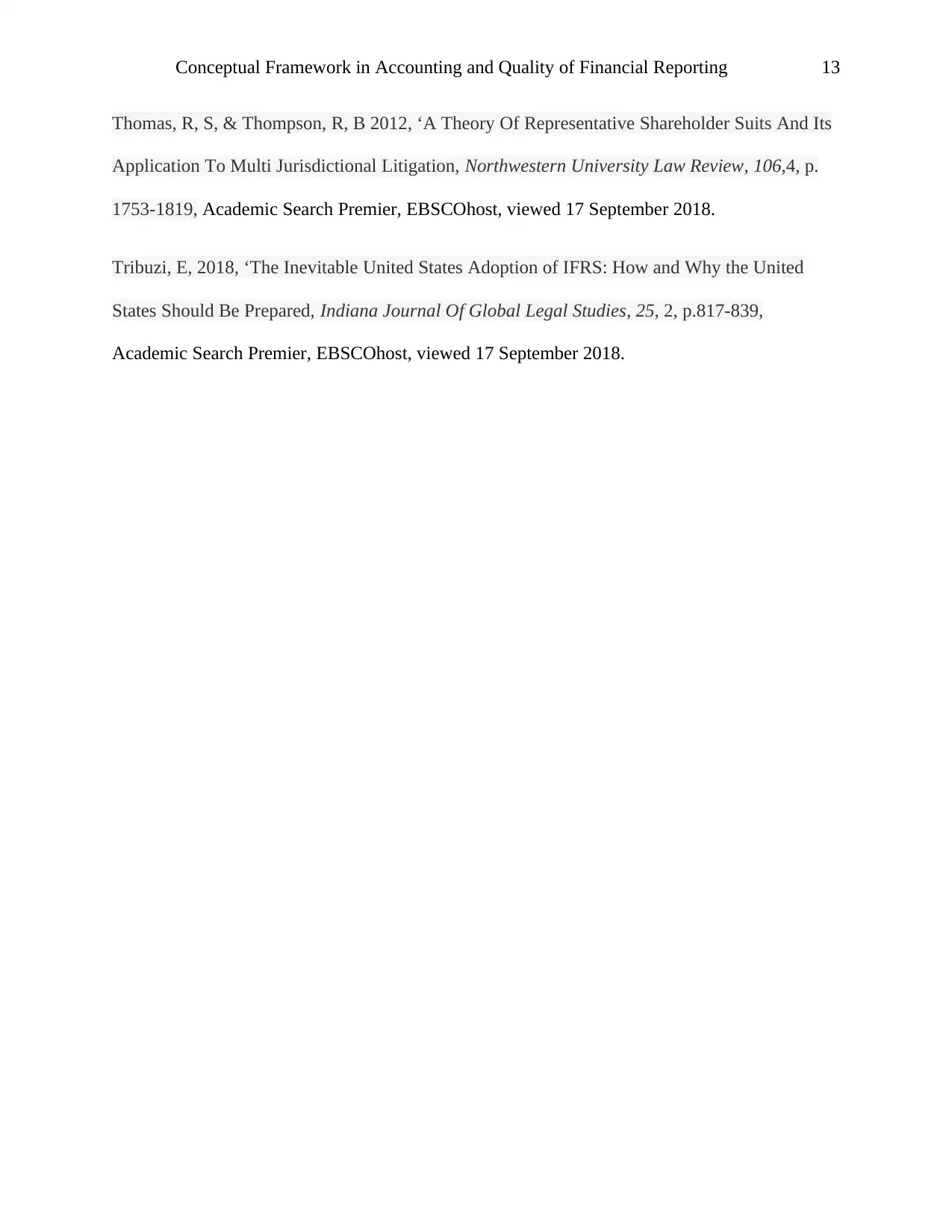
Conceptual Framework in Accounting and Quality of Financial Reporting 13
Thomas, R, S, & Thompson, R, B 2012, ‘A Theory Of Representative Shareholder Suits And Its
Application To Multi Jurisdictional Litigation, Northwestern University Law Review, 106,4, p.
1753-1819, Academic Search Premier, EBSCOhost, viewed 17 September 2018.
Tribuzi, E, 2018, ‘The Inevitable United States Adoption of IFRS: How and Why the United
States Should Be Prepared, Indiana Journal Of Global Legal Studies, 25, 2, p.817-839,
Academic Search Premier, EBSCOhost, viewed 17 September 2018.
Thomas, R, S, & Thompson, R, B 2012, ‘A Theory Of Representative Shareholder Suits And Its
Application To Multi Jurisdictional Litigation, Northwestern University Law Review, 106,4, p.
1753-1819, Academic Search Premier, EBSCOhost, viewed 17 September 2018.
Tribuzi, E, 2018, ‘The Inevitable United States Adoption of IFRS: How and Why the United
States Should Be Prepared, Indiana Journal Of Global Legal Studies, 25, 2, p.817-839,
Academic Search Premier, EBSCOhost, viewed 17 September 2018.
Paraphrase This Document
Need a fresh take? Get an instant paraphrase of this document with our AI Paraphraser
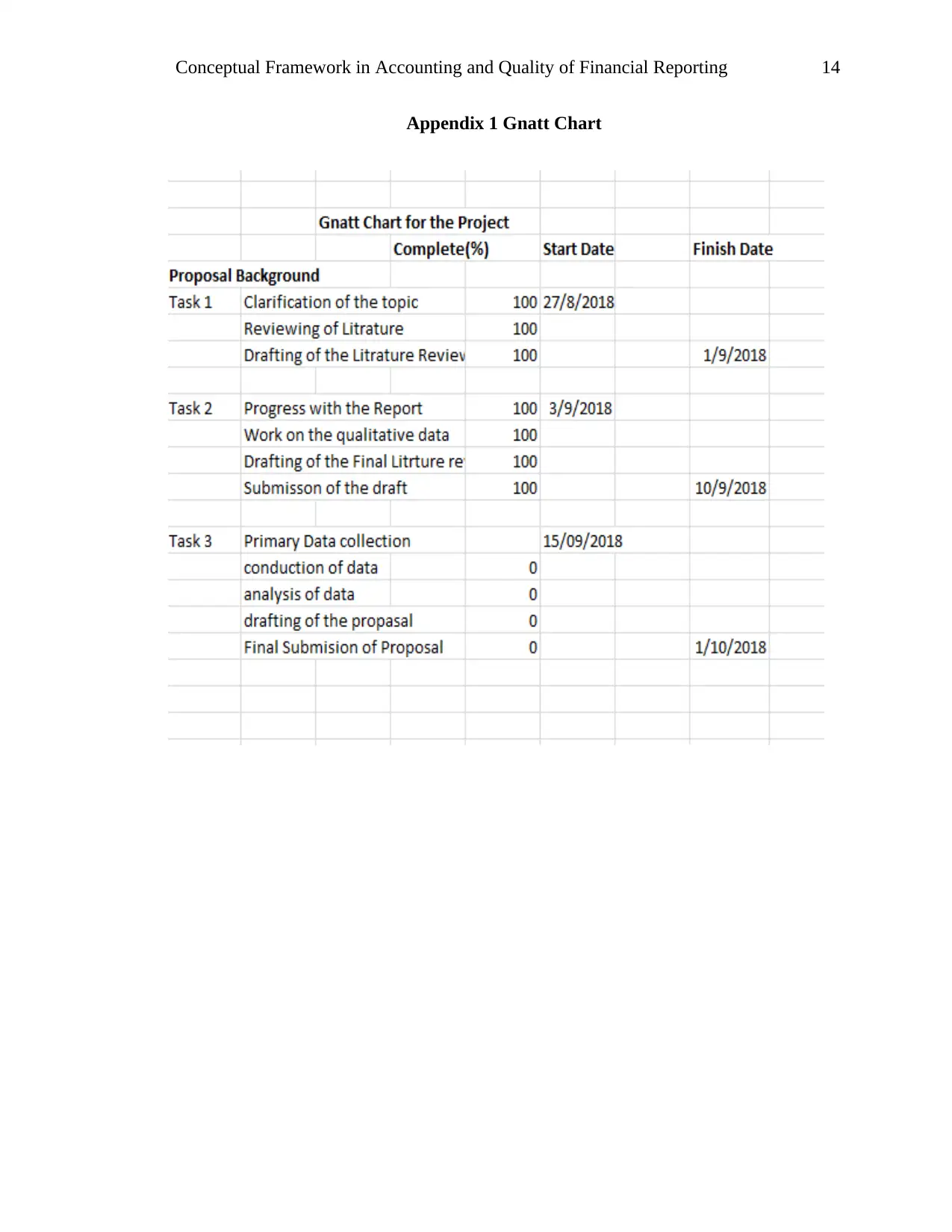
Conceptual Framework in Accounting and Quality of Financial Reporting 14
Appendix 1 Gnatt Chart
Appendix 1 Gnatt Chart
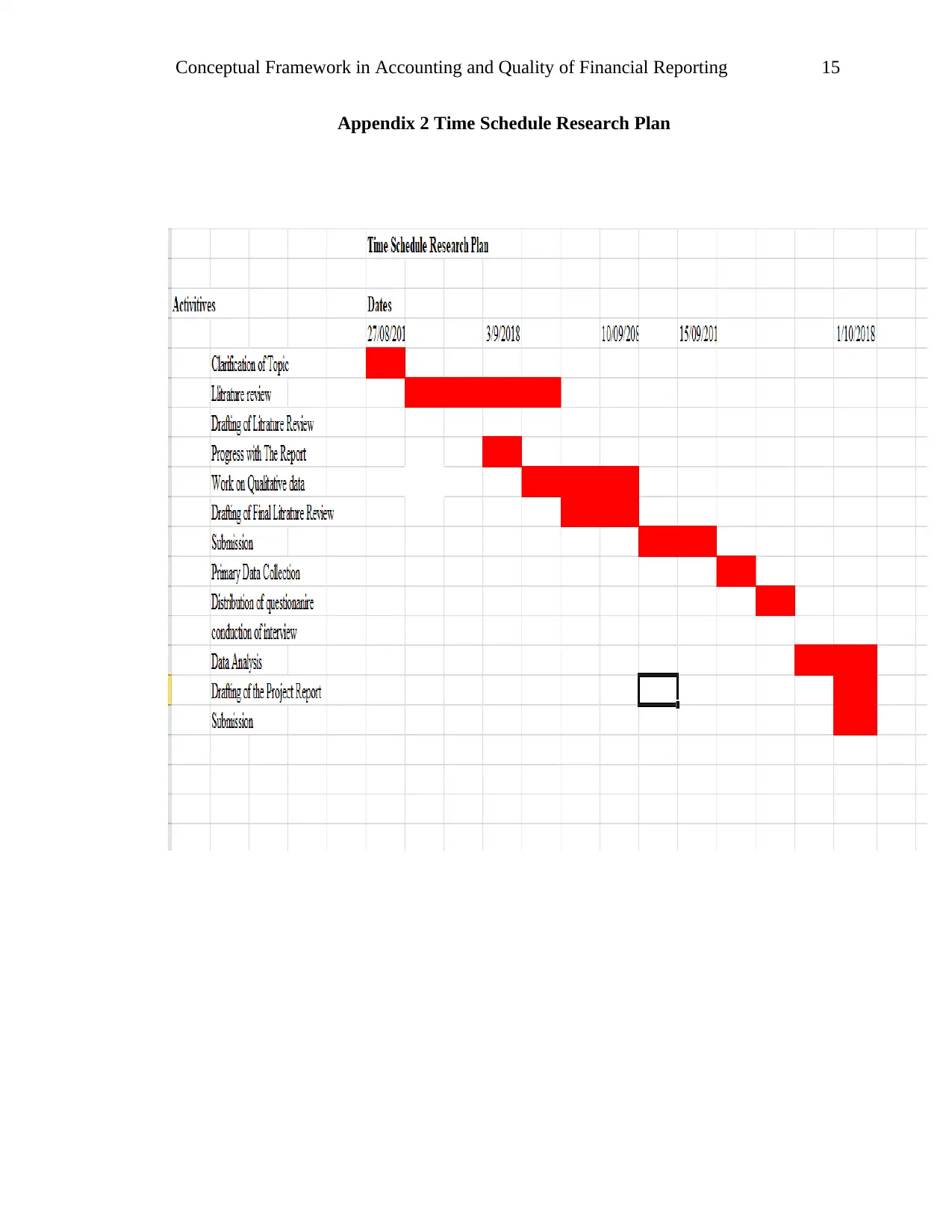
Conceptual Framework in Accounting and Quality of Financial Reporting 15
Appendix 2 Time Schedule Research Plan
Appendix 2 Time Schedule Research Plan
1 out of 15
Related Documents
Your All-in-One AI-Powered Toolkit for Academic Success.
+13062052269
info@desklib.com
Available 24*7 on WhatsApp / Email
![[object Object]](/_next/static/media/star-bottom.7253800d.svg)
Unlock your academic potential
© 2024 | Zucol Services PVT LTD | All rights reserved.





